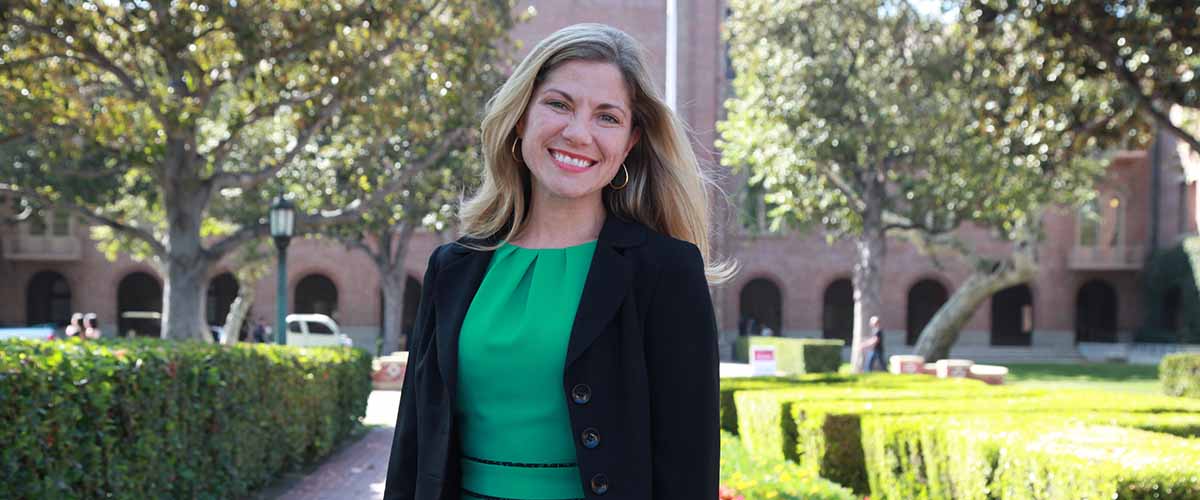
Julie Posselt receives tenure and promotion to associate professor
Congratulations to Pullias Center faculty member Julie Posselt, who recently received tenure and was promoted to associate professor of education, with a focus on higher education!
Posselt is a national expert on graduate admissions and the author of Inside Graduate Admissions: Merit, Diversity, and Faculty Gatekeeping (Harvard University Press, 2016). Rooted in sociological and organizational theory, her research program examines institutionalized inequalities in higher education and organizational efforts aimed at reducing inequities and encouraging diversity. She focuses on selective sectors of higher education— graduate education, STEM fields, and elite undergraduate institutions—where longstanding practices and cultural norms are being negotiated to better identify talent and educate students in a changing society.
In an interview earlier this month, Posselt shared her plans for her future research and her advice for emerging scholars.
You’re best known as a national expert on graduate admissions. What interested you in this subject specifically? How did you come to choose that research area?
I was working with the McNair Scholars program [a U.S. Department of Education-funded effort designed to prepare undergraduate students for doctoral studies] at the University of Northern Colorado, and I saw really excellent students being denied admission from programs that weren’t particularly selective. And I saw students with what I considered to be real red flags on their records getting into top-ranked places. This told me there was something more than academic standards driving the process, and I was curious about what that might be.
I started my PhD program looking at access to graduate education, broadly, because I saw it was a very understudied area. Graduate education has becoming increasingly important not only for high-status and high-paying positions, but also middle class jobs like social work and education. I thought, we need to better understand the structure of access to this part of the educational system is.
What other areas of research are you also pursuing?
I have also spent a lot of time looking at undergraduate admissions, and I continue to have an interest in access to selective colleges and universities, as well as access to and equity within disciplines where people of color and women tend to be underrepresented. That includes STEM fields, but also some fields in the humanities like philosophy and others in the social sciences like economics.
I have a strong interest in disciplinary cultures. One of the most interesting things about higher education is we have, within any given university, a whole bunch of different worlds that simultaneously exist, and in which people think very differently from one another, even though the actions they often take at the end of the day resemble each other.
I also study mental health in higher education. The core questions around access I was asking led to a commitment to understanding the quality of life for underrepresented groups who do get in, who do enroll. It turns out that one of the big under-acknowledged factors in inequality concerns the culture of competition created within the academy. One manifestations of this unhealthy culture is high rates of mental illness in higher education— over and above the general population.
What do you find valuable about being a faculty member at the Pullias Center?
I greatly appreciate the opportunity to work with my colleagues, both the faculty members as well as the students and the staff. I was excited about coming to USC in 2016 because there’s a strong group of people who think about equity issues from an organizational perspective, not just in Pullias but across the higher education concentration. I feel like it’s a great intellectual community. I treasure the students and the vibrancy they bring to the center, my classes, and my research group.
Now, as a tenured associate professor, what are you most looking forward to doing?
Just before I went up for tenure, I got several new grants. So for the next several years, that’s going to be a big part of how I dedicate my time. It’s a combination of research activity and organizing faculty who are committed to making graduate education more equitable. I’m doing that within California by creating the California Consortium for Inclusive Doctoral Education project with six graduate schools, including USC’s. I’m also working on the national level within STEM through the Inclusive Graduate Education Network.
I’m finishing my second book manuscript this spring as well as an edited volume with Adrianna Kezar about administration in higher education, and I’m writing a monograph with several of my graduate students about evaluation and decision making for equity.
From your experience, what advice would you give emerging scholars interested in higher education research?
I would say keep reading! Keep reading books, keep reading journal articles, keep reading fiction. It’s a very nourishing and critical part of developing a voice as a writer. Dedicate time every day to reading, and control your time on social media — for all sorts of reasons. Putting good words in your ear gives you good thoughts to think and that means good perspective on the field. Read widely— see what you can learn from people who are very different from yourself, or who think very differently.